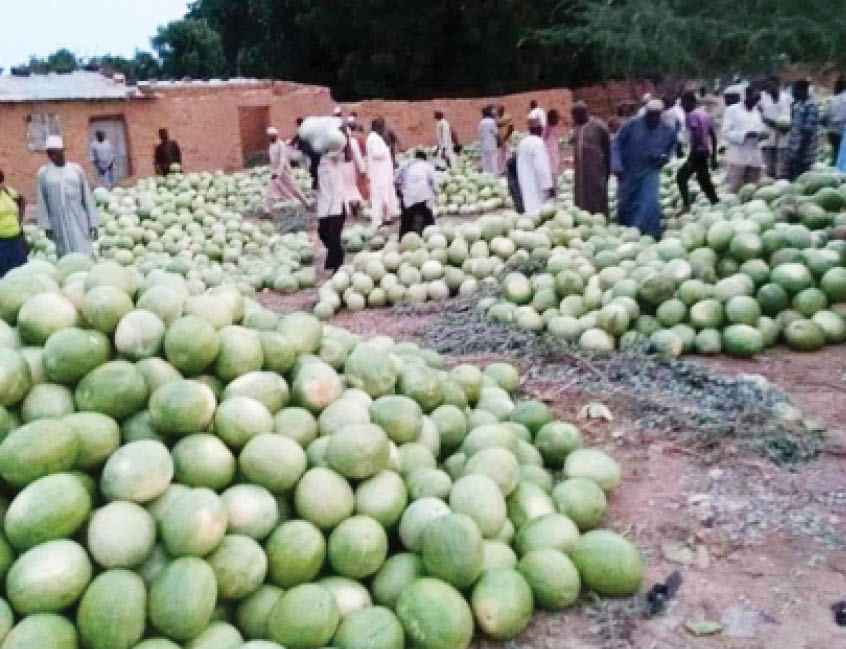Ramadan: Multiple blessings for Yobe watermelon farmers
Usually, millions of Muslims around the world break their fast (Iftar) with dates, water and watermelon during Ramadan, a month of fasting, which is a time for spiritual reflection and self-discipline. It was gathered that incorporating fruits like watermelon into Iftar can offer hydration and essential nutrients to replenish the body after a day of […]

a watermelon market in yobe
Usually, millions of Muslims around the world break their fast (Iftar) with dates, water and watermelon during Ramadan, a month of fasting, which is a time for spiritual reflection and self-discipline.
It was gathered that incorporating fruits like watermelon into Iftar can offer hydration and essential nutrients to replenish the body after a day of fasting, which is why the demand for watermelon during Ramadan fasting period is increasing.
There are eight local government areas that are the largest producers of watermelon in Yobe State—Bursari, Bade, Geidam, Jakusko, Damaturu, Gujba, Potiskum and Machina.
Annually, watermelon farmers in the above local government areas are in top gear of preparation to witness the most seasonal period of their sales in the month of Ramadan. This is why they have taken watermelon farming as one of the lucrative sources of making money.
Traders usually take trucks of watermelon from Yobe to Abuja, Borno, Taraba, Jigawa, Kano and Lagos states and other parts of the country.
Daily Trust on Sunday learned that in this month of Ramadan, a basket that contains 100 watermelons, which was sold at N50,000 during the rainy season, has doubled to N100,000 as a result of demand.
Alhaji Maina Bukar, a watermelon farmer, said farmers usually looked forward to the Ramadan fasting period to harvest their watermelons and make huge profits due to demand.
‘‘I have spent at least seven years in watermelon farming. I rely so much on rain due to its low risk, unlike irrigation. Last time, during the rains I spent over N800,000 on my farmland, with the expectation that I would make profit, but unfortunately, I lost due to some reasons.
‘‘This time around, I invested over N300,000, hoping to harvest watermelons worth N600,000 because it is believed that this period (Ramadan) is a time for us to smile.
‘‘You might be aware that a basket of watermelon that contains 100 watermelons was sold between N50,000 and N60,000 during the rains, but it has doubled to N100,000 as a result of demand this period.
‘‘Last year, during Ramadan period, I expected that I would harvest 50 baskets of watermelon, which contain 5,000, but unfortunately, it wasn’t harvested due to scarcity of rains.
‘‘I will harvest my watermelons on Friday, God willing, so that I can sell them before the end of Ramadan. We usually sold one watermelon at N500 before Ramadan, but now, you cannot sell it at that price,’’ he said.
Another farmer, Umaru Adamu also said, ‘‘Watermelon farmers are used to smiling and making brisk business during this period as demand is usually very high.
‘‘I made my first million in the Ramadan of 2023. This year, I supplied watermelon to other states, including Cross River, Abia, Anambra, Enugu and Lagos. Watermelon farming is profitable.’’
‘‘During the rainy season, we used to sell each watermelon between N200 and N500, depending on the size, but we have a new price in Ramadan. We sell at N3,000, N2,000 or N1,000. The demand determines the price.
Muhammad Ibrahim told Daily Trust on Sunday that the price of watermelon is determined by the traders, demand and availability in the market.
‘‘When a commodity is available in the market, we know that the price won’t go high despite the season. But watermelon harvested during the rainy season is likely to be cheaper than the one harvested during Ramadan.
‘‘One of the factors that push the price of watermelon up is irrigation farming because it is more expensive than during the rains. The current fuel subsidy removal and market demand, especially during the fasting period, are other issues,’’ he explained.
Daily Trust on Sunday learnt that the price of watermelon is now between N4,000 and N5,000 in Maiduguri, the Borno State capital as a result demand, and farmers are smiling.
